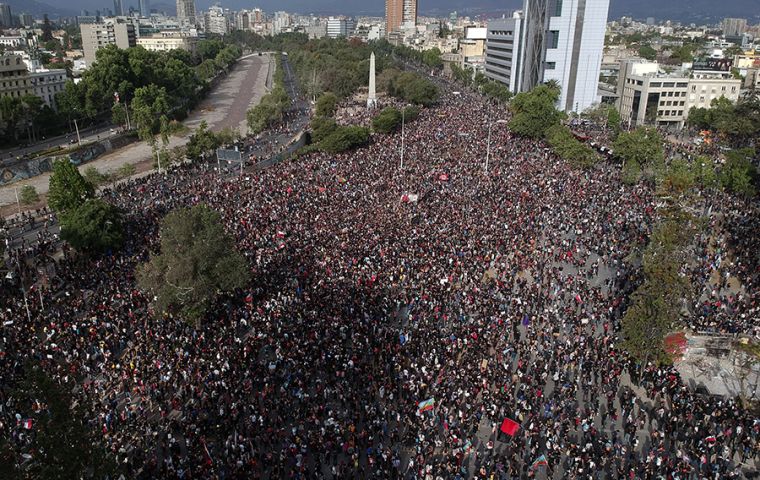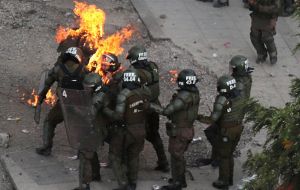MercoPress. South Atlantic News Agency
Three weeks of protests and looting in Chile: demands for a new constitution and a change in the political system
 Tens of thousands of people gathered in Plaza de Italia, the epicenter of the unrest over economic inequality and other woes
Tens of thousands of people gathered in Plaza de Italia, the epicenter of the unrest over economic inequality and other woes  Fights broke out with police trying to contain them, with officers firing water cannons and tear gas. Officers were hit in the faces with a Molotov cocktail.
Fights broke out with police trying to contain them, with officers firing water cannons and tear gas. Officers were hit in the faces with a Molotov cocktail. Protesters in Chile clashed with police, looted stores and endured a strong earthquake at the close of a huge rally kicking off the third week of anti-government demonstrations that have sparked deadly unrest. In effect as protestors promised it was a “super Monday”, rather a heck of a Monday.
Tens of thousands of people gathered in Plaza de Italia, the epicenter of the unrest over economic inequality and other woes, and tried to march on the presidential palace in downtown Santiago.
Fights broke out with police trying to contain them, with officers firing water cannons and tear gas. Officers were hit in the faces with a Molotov cocktail.
People banged pots and pans and blared the horns of their cars as night fell in Santiago.
Barricades were set up for the first time -- near a shopping mall that features the tallest skyscraper in Latin America.
The 6.0 magnitude earthquake hit just as tensions were rising in Santiago, rattling buildings. A strong and prolonged shaking was felt, but there were no reports of injuries or damage.
Looting and vandalism was reported in the cities of Viña del Mar, Valparaiso, Concepcion, and even further south, in Valdivia, Osorno and Temuco..
Protesters angry at the high cost of living, the gap between rich and poor, tight pensions and expensive health care are demanding the resignation of conservative President Piñera and a new constitution.
Piñera held talks with opposition parties last week but they said he failed to convince them he has the will to make the necessary changes to calm the protests. But protests seem now to be geared more against the whole political system arch, from Socialists and Communists to hard core conservatives who long for Pinochet times.
In effect the slogan which has taken up more force is one that says “30 Pesos won't make up for 30 Years”, in reference to the metro ticket increase of 30 Pesos (less than 10 US cents) which triggered the social outburst but was later suspended. Thirty years refers to the return of democracy in 1990.
Prosecutors say 20 people have died in unrest since the protests began on October 20.
A UN human rights mission is investigating allegations of police brutality. The official number of civilians injured in the clashes was put at 1.400 by Chilean authorities, but contested by the Red Cross which insists in some 2.500. The militarized police, Carabineros, fighting the rioting have suffered 960 injured members, including two burnt by a Molotov bomb in their faces.
Piñera tried to crack down on the riots in the first week but the bid backfired. The president was also forced to cancel the hosting of two major international summits including the COP climate meeting due to the unrest.
Likewise the final of the Libertadores Cup, the main South American football trophy which is scheduled to be played at the National Stadium of Santiago in the last week of November is now in doubt. An urgent meeting of South American football associations is taking place to decide on a new location. Some 30.000 Brazilian and Argentine fans are expected for the match which will see Rio's Flamengo play River Plate from Buenos Aires.
The Chilean government insists the game can be played and fears that leaving Santiago out of the dispute could mean it has been unable to control the situation.
Protesters organized rallies on Super Monday under the slogan “This is not over.” Some citizens returned to work despite vandalism that has damaged the underground train network.
The government said Chile's economy grew three percent in September but it forecast a contraction of 0.5% in October due to the unrest and estimated damage losses to be above the one billion dollars. .
The current Chilean constitution dates back to the 1973/1990 dictatorship of General Augusto Pinochet, and has since suffered minor amendments, but none of those demanded by the social outburst. A survey by pollster Cadem published on Sunday indicated that 87% of Chileans favored such reforms. Likewise the study indicated Pinera's approval rating had plunged to 13%.
The Pinochet constitution, had a very complicated system to implement major amendments, needing special legislative majorities, which could easily be frustrated by an electoral system that ensured a hard core conservative representation in Congress.




Top Comments
Disclaimer & comment rulesCommenting for this story is now closed.
If you have a Facebook account, become a fan and comment on our Facebook Page!